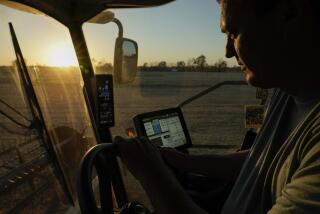Earthwatch
- Share via
Warming Bonus
Global warming has helped Australian farmers reap bumper crops of wheat, according to researchers at the Bureau of Meteorology Research Center in Melbourne. Neville Nicholls announced the finding in the journal Nature, citing several effects of climate change. The frequency of severe frosts had decreased in eastern Australia in recent decades, he wrote. Increases in rainfall and soil moisture also appear to have resulted from the gradual climb in average annual temperatures. Although Australian farmers are benefiting, global warming is blamed for causing the Sahara Desert to expand, and is producing more powerful tropical cyclones in some areas.
Tornado Outbreak
A slowly moving storm centered in the heartland of America triggered swarms of destructive tornadoes for three days, from the Great Plains to central Texas and Florida. The hardest hit area was north of Austin, Texas, where the most deadly string of tornadoes in the state in decades obliterated an entire neighborhood inthe town of Jarrell. National Weather Service meteorologists tracking the tornado swarm by radar were able to give residents 35 minutes of warning. But the storm was so severe, and its damage so widespread, that there were few safe places to take shelter.
Tropical Storms
A broad swath of the Philippines was swamped by torrential rains produced when tropical storm Levi formed over the center of the island nation. At least 53 people were killed in the inundations, and 77,000 others were forced from their homes.
Popo Eruptions
Central Mexico’s Popocatepetl Volcano continued to produce regular eruptions, sending ash and gases nearly 10,000 feet above the suburbs of Mexico City. The 17,887-foot volcano has been blowing out ash and rock intermittently for the past month. Nearby residents have been put on alert, but scientists estimate there is less than a 10% chance of a violent eruption.
Earthquakes
One of the most powerful earthquakes this year, centered near the remote Kermadec Islands, soundly rocked New Zealand, which is more than 600 miles to the southwest. There were no reports of damage, but some of the countrys rail service was briefly halted to check the tracks.
Earth movements were also felt in southern Japan, metropolitan New Delhi, northwest Iran, northern Israel and southern Lebanon, western Nicaragua, southwestern Mexico and south-central Alaska.
Natural-Borne Killer
Indian scientists say they have isolated a fungus found in rice paddies that could be used to fight malaria and other mosquito-borne diseases. Dr. Ashwini Kuwar, of the Malaria Research Center in the southern territory of Goa, says the fungus, named MRC-367, can kill mosquito larvae in three hours.
Additional Sources: U.S. Climate Analysis Center, U.S. Earthquake Information Center and the World Meteorological Organization.
More to Read
Sign up for Essential California
The most important California stories and recommendations in your inbox every morning.
You may occasionally receive promotional content from the Los Angeles Times.










